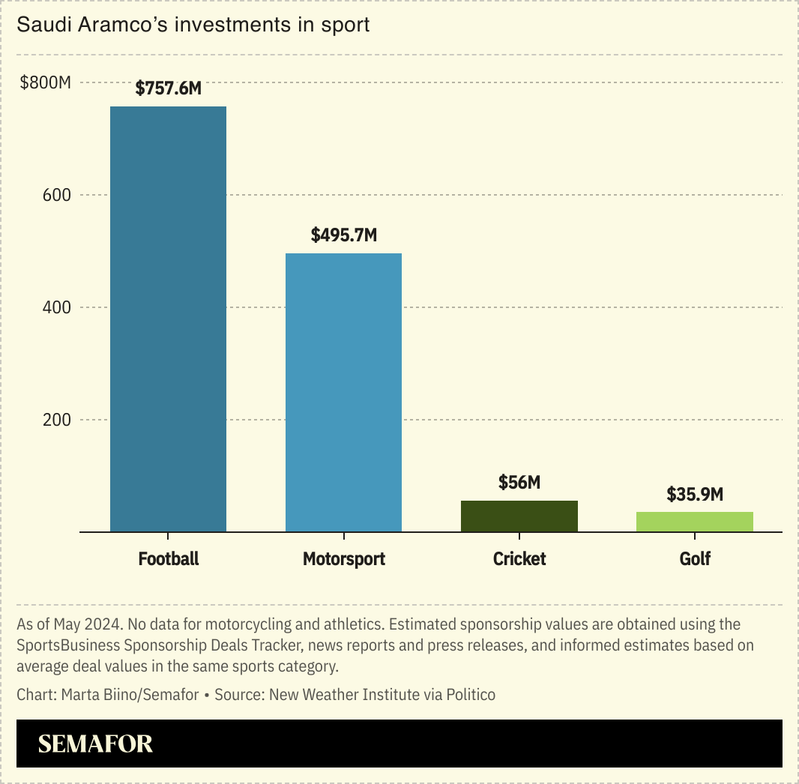The News
Fossil fuel companies have spent at least $5.6 billion in sponsorship money across global sports, according to a new report published by New Weather Institute, a climate activism think tank.
The single biggest source of money identified was Aramco, Saudi Arabia’s state oil company, which has poured an estimated $1.3 billion into sponsorship deals, primarily in soccer and motorsports. But almost all major sports have some sponsorship coming from fossil fuel companies, the report found, with rugby and golf also ranking high among the disciplines with the most active deals.
Environmental activists have criticized these deals as a kind of “sportswashing,” with fossil fuel companies and oil states using sponsorship deals to burnish their reputation, keep regulators’ scrutiny of their business at bay, and invite more foreign investment.
Saudi crown prince Mohammed bin Salman told Fox News last year: “If sportswashing is going to increase my GDP by 1%, then we’ll continue doing sportswashing.”

SIGNALS
Tobacco-style limitations could curb ‘sportswashing’
“Sportswashing” — where fossil fuel companies sponsor sporting events — is not new, one industry expert told Politico, with Western oil companies first using it decades ago to prevent regulator scrutiny over safety and workers’ rights. Solutions offered by advocates include applying the same or similar restrictions imposed on other industries, like tobacco, on fossil fuel sponsorships, or more transparency about sponsors’ environmental impact. “If sport is used as a billboard to promote the very companies, products and lifestyles that fuel climate breakdown, it becomes at best an obstacle to climate action, and at worst fans the flames of a heating planet,” the report noted.
Awareness may have little effect on fans
While there is more awareness around how fossil fuel companies and oil states interact with the sports world, particularly following soccer’s highly controversial 2022 FIFA World Cup in Qatar, research suggests the impact on fans may be minimal, a sports marketing expert noted in The Conversation. “Fans who enjoy a strong connection with a team (and with their fellow fans) will usually choose to avoid criticising the team they support,” she noted. Some soccer fans in the UK have embraced clubs being owned in full or partly by Saudi Arabia and UAE companies because the cash has bought success, The Guardian noted.
The impact of climate change is increasingly being felt on the field
Besides the ethical issues that may be raised by accepting sponsorship from fossil fuel companies, the sports industry has also been late to analyzing its own carbon footprint, the New Weather Institute report found. Sports was estimated in 2020 to emit 350 million tons of CO2, more than did Spain that year, according to non-profit group Rapid Transition Alliance. Meanwhile, climate change is being felt in the industry on many different levels: The 2024 Paris Summer Olympics was affected by extreme heat, underscoring how rising temperatures could make some outdoor sports events too risky in the future.



